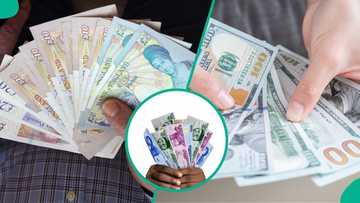New Price Emerges as Naira Strengthens Against Dollar Amid Currency Reforms in July 2025
- On the first trading day of July 2025, the naira strengthened slightly against the dollar on both the Nigerian Foreign Exchange Market (NFEM) and the parallel market
- Last week saw improved foreign currency liquidity and significant inflows from Foreign Portfolio Investors (FPIs), contributing to the naira's appreciation.
- However, the naira had the worst performance of any African currency between 2023 and 2024, losing 131.8% of its value, amid challenges like inflation and others
Legit.ng journalist Zainab Iwayemi has 5-year-experience covering the Economy, Technology, and Capital Market.
On Tuesday, the first trading day of July 2025, the naira strengthened versus the dollar on all foreign exchange (FX) markets, maintaining a trend of relative currency stability fueled by ongoing reforms.

Source: Getty Images
According to data from the Central Bank of Nigeria (CBN), the naira strengthened slightly by N0.14 at the Nigerian Foreign Exchange Market (NFEM), ending at N1,529.57 per dollar as opposed to N1,529.71 on Monday.
In the parallel market, the value of the naira increased by N10, closing at N1,560, up 0.6 percent from the previous day's value of N1,570.
Last week, the foreign currency market saw a significant increase in US dollar liquidity due to higher sell-side engagement and more inflows from Foreign Portfolio Investors (FPIs).
A report by Access Bank highlighted that the naira gained N6.43 to settle at N1,545.20 per US dollar, indicating a moderate appreciation supported by the improved supply.
Analysts at the bank stated that if the current trend in capital inflows continues, persistent FPI inflows should keep exchange rates under downward pressure in the foreseeable future.
According to exchange rate data provided by Afreximbank and other sources, South Sudan, Zimbabwe, and Nigeria recorded the most currency depreciations versus the US dollar in 2024, reflecting the continent's diverse economic circumstances.
According to the statistics, monetary policy changes, inflationary pressures, fiscal imbalances, and in certain situations, significant exchange rate reforms caused sharp drops in some currencies while keeping others relatively steady.
The paper states that between 2023 and 2024, Nigeria's naira had the poorest performance of any African currency, losing 131.8 percent of its value in relation to the US dollar.
Following continuous efforts by the Central Bank of Nigeria to harmonize currency rates and draw in foreign investment despite continued foreign exchange shortages and high inflation, the value of the naira dropped from N636.13 to N1,474.60 to the dollar.
South Sudan's pound, which fell 131.1 percent from 930.33 to 2,150.00 per dollar within the same time period, was not far behind Nigeria. The country's primary source of foreign cash earnings, oil income, have been disrupted by fighting and ongoing fiscal instability, according to analysts.
Following an astounding 835.9 percent loss the year before, Zimbabwe's currency likewise maintained its problematic trajectory, dropping 55.6 percent from 3,509.17 in 2023 to 5,460.00 in 2024.
The nation still faces pressures from dollarization, hyperinflation, and low trust in monetary authorities despite continuous improvements.
Ethiopia (51.7 percent), Egypt (47.9 percent), and Malawi (53.7 percent) also saw significant depreciations. Local currencies suffered significant losses in all three situations as governments struggled with growing debt costs, cuts to subsidies, and policy changes supported by the IMF.

Source: Getty Images
One among the worst-performing currencies in 2022, the Ghanaian cedi lost further 28.6% of its value in 2024 due to restrictive external financing conditions and persistent balance-of-payments issues.
The Zambian kwacha lost 29.4% of its value while Angola's kwanza depreciated 27%, highlighting the fiscal and external weaknesses of several commodity-dependent economies.
Nigeria’s debt grows amid naira depreciation
Legit.ng reported that the Debt Management Office (DMO) reports that in the first quarter (Q1) of 2025, Nigeria's total national debt increased to N149.38 trillion.
The debt office revealed that the total national debt increased by N4.72 trillion, or 3.3 percent, from the N144.67 trillion recorded in the fourth quarter (Q4) of 2024.
According to the DMO, the overall external debt stands at N70.63 trillion ($45.9 billion), while the total internal debt is N78.75 trillion ($51.2 billion).
Source: Legit.ng




